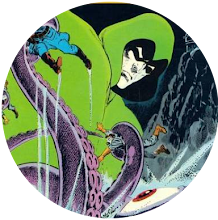 |  |
As I roam the streets of Sheffield, people often say to me, "Steve, I know your hands are deadly weapons, before which no mere house brick could hope to stand, and often are the times you've thwarted the fiends of this world with your feet of steel but how did a simple lad from a Sheffield council estate get to have such a mastery of the Eastern arts of murder?"
I tell them it's simple. I learned all I know about the way of the Oriental punch-up from Shang-Chi, Master of Kung Fu.
As though Marvel UK's weekly Avengers mag couldn't get any better, in March 1974, the Avengers and Dr Strange were joined in it by the son of Fu Manchu, and the world was never the same again. Each week we could thrill to Shang-Chi giving foe after foe a punch in the bracket inbetween bouts of philosophising, mostly along the lines that the praying mantis can defeat the mighty elephant because, unlike the wrathful pachyderm, it keeps its composure in the face of provocation. Such was his importance that, for long months, Shang-Chi featured on each week's front cover, relegating the Avengers to the status of back-up strip in their own comic.
Did he deserve to?
Of course he did. Great as the Avengers were, Shang-Chi had a greatness all his own, one that totally transcended his status as cultural cash-in.
It seems odd now to think that, back in those early days, Shang-Chi was drawn not by Paul Gulacy - the artist I most associate with him - but by Jim Starlin, a man I associate with cosmic fare like Captain Marvel and Warlock. But the man they called Judo Jim did indeed help to bring the master of Kung Fu into this world and he did a brilliant job of it.
Starlin's artwork and page composition on this debut story are magnificent as, having been tricked into murdering the dying Dr John Petrie, Shang-Chi attacks his own father's HQ, battling assassins, the huge Sumo wrestler Tak and a giant insane gorilla along the way. It's a hauntingly grim tale, giving us a hero trained to further his father's empire of evil, one who makes his first foray into the outside world by killing a bed-ridden octogenarian, before a confrontation with his victim's friend Denis Nayland Smith - crippled by Fu Manchu - makes him realise it's his own father who's the threat to mankind, not his recent victim.
It has to be said, given all that Shang-Chi goes through to get to his father in this tale, the fact that when he finally reaches the heart of the fiend's lair, he just has a conversation with him, rather than bashing his head in, does feel like a let-down and makes no great sense. But, of course, the series would've been over before it'd begun if that'd happened and it does give Fu Manchu the chance to be stylishly evil in those closing moments, while setting things up nicely for the rest of the series.
Shang-Chi, Master of King Fu should never have been any good - being as it was, an obvious leap onto the martial arts bandwagon that was then sweeping the world, and its use of the hoariest of stereotypical villains. But its artistic success proves there's no such things as good ideas or bad ideas, just good and bad execution - and Master of Kung Fu, right from the start, had the finest of executions, even if the unfortunate Dr John Petrie might have argued otherwise.
 |
| Thanks to Fu Manchu, I know to end every conversation by receding into darkness. |










































































6 comments:
I've got both these comics too - or I had. I'm off to check you haven't nicked them from me.
With my Ninja skills I can steal anything from anyone.
Good call!And that Avengers cover is a beaut!
I love how aggro he looks on it, compared to his more composed air on the original Starlin cover.
Avengers UK # 28 has always been one of my favourite covers, and Shang-Chi one of Marvels best. In fact your blog was an inspiration for a post I did on my own blog a few weeks ago.
http://stardustkid.blogspot.com/2011/03/fellow-blogger-steve-does-comics-ran.html
Hi, Stardust. I must admit it's always a shock to discover any of my blogs have inspired anyone to do anything other than jump in front of a train, so I take great pleasure from discovering that I inspired you to post a cover of the mighty Look-In magazine.
Post a Comment